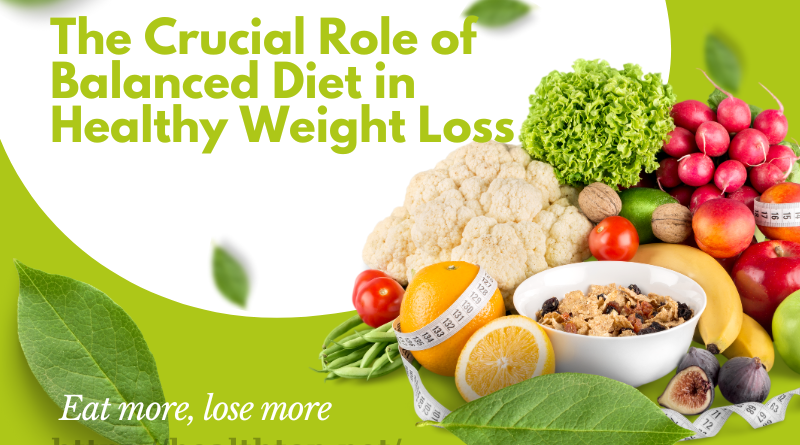The Crucial Role of Balanced Diet in Healthy Weight Loss
In the quest for weight loss, many individuals embark on various diets and exercise regimes, often overlooking the fundamental importance of a balanced diet. While quick fixes and fad diets may offer temporary results, sustainable weight loss and overall health require a balanced approach to nutrition. This article delves into the benefits and significance of maintaining a balanced diet for achieving healthy weight loss.
Contents
- 1 Understanding a Balanced Diet:
- 2 Importance of Balanced Diet for Weight Loss:
- 2.1 Nutrient Density:
- 2.2 Liv Pure Supplement Review: Making Informed Decisions for a Healthier You
- 2.3 Benefits from sex you should know
- 2.4 Metabolic Health:
- 2.5 Muscle Preservation:
- 2.6 Sustainable Weight Loss:
- 2.7 11 nutritious foods you should know
- 2.8 Psychological Well-being:
- 2.9 Long-Term Health Benefits:
- 2.10 Practical Tips for Achieving a Balanced Diet:
- 2.11 What do you know about weight loss pills?
Understanding a Balanced Diet:
A balanced diet encompasses the consumption of a variety of foods in appropriate proportions to meet the body’s nutritional needs. It typically includes whole grains, fruits, vegetables, lean proteins, and healthy fats. Each of these food groups provides essential nutrients vital for the body’s functions, including vitamins, minerals, protein, carb Importance of Balanced Diet for Weight Loss:
Importance of Balanced Diet for Weight Loss:
Nutrient Density:
A balanced diet ensures that the body receives a wide array of nutrients necessary for optimal functioning. Nutrient-dense foods such as fruits, vegetables, and whole grains provide essential vitamins, minerals, and antioxidants while being relatively low in calories. This helps individuals maintain a calorie deficit for weight loss without compromising nutritional intake.
Liv Pure Supplement Review: Making Informed Decisions for a Healthier You
Benefits from sex you should know
Satiety and Hunger Regulation:
Including adequate protein, fiber, and healthy fats in meals promotes feelings of fullness and satiety, reducing the likelihood of overeating or snacking on unhealthy foods. Balanced meals help regulate blood sugar levels, preventing spikes and crashes that can lead to cravings and excessive calorie consumption.
Metabolic Health:
A balanced diet supports metabolic health by providing the nutrients needed for efficient energy production, hormone regulation, and metabolism of macronutrients. Consuming balanced meals helps stabilize blood glucose levels and insulin sensitivity, promoting fat metabolism and preventing excessive fat storage.
Muscle Preservation:
Protein-rich foods are essential for muscle preservation during weight loss. Including adequate protein in the diet supports muscle repair and growth, preventing muscle loss commonly associated with calorie restriction. Preserving lean muscle mass is crucial for maintaining metabolic rate and facilitating long-term weight management.
Sustainable Weight Loss:
Unlike restrictive diets that eliminate entire food groups or severely restrict calorie intake, a balanced diet offers a sustainable approach to weight loss. By incorporating a variety of foods and allowing flexibility in food choices, individuals are more likely to adhere to their dietary plan in the long term, leading to sustainable weight loss outcomes.
11 nutritious foods you should know
Psychological Well-being:
A balanced diet not only nurtures physical health but also supports psychological well-being. Enjoying a diverse range of foods provides satisfaction and enjoyment, reducing feelings of deprivation often associated with restrictive diets. This positive relationship with food fosters a healthier mindset towards eating and promotes overall happiness and mental health.
Long-Term Health Benefits:
Adopting a balanced diet for weight loss not only yields short-term benefits but also contributes to long-term health and disease prevention. A diet rich in fruits, vegetables, whole grains, and lean proteins is associated with a lower risk of chronic diseases such as obesity, type 2 diabetes, cardiovascular disease, and certain cancers.ohydrates, and fats.
Practical Tips for Achieving a Balanced Diet:
Prioritize whole, minimally processed foods.
Include a variety of fruits and vegetables in every meal.
Choose lean protein sources such as poultry, fish, beans, and tofu.
Incorporate whole grains such as quinoa, brown rice, and oats.
Opt for healthy fats from sources like avocados, nuts, seeds, and olive oil.
Practice mindful eating and listen to hunger and fullness cues.
Stay hydrated by drinking plenty of water throughout the day.
Plan meals and snacks ahead to avoid impulsive food choices.
Limit intake of added sugars, refined grains, and processed foods.
Seek support from a registered dietitian or nutrition professional
What do you know about weight loss pills?
In the journey towards healthy weight loss, the importance of a balanced diet cannot be overstated. By nourishing the body with a variety of nutrient-dense foods in appropriate proportions, individuals can achieve sustainable weight loss while supporting overall health and well-being. Embracing a balanced approach to nutrition not only fosters physical vitality but also cultivates a positive relationship with food, paving the way for long-term success and optimal health.


Pingback: What time should you eat to lose weight the fastest?
Pingback: What is a balanced diet and how to achieve it? Healthtop.net
Pingback: Top 19 Heart-Healthy Foods You Must Include in Your Diet! -
Pingback: 11 Vegetables to Help Support Your Weight Loss -
Pingback: Garlic and its uses you need to know! - Healthtop.net